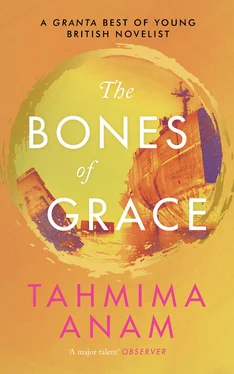‘Are you all right?’ she asked again. She held my elbow so she could face me fully.
I went on the offensive. ‘What, I can’t buy my mother a present?’ I glanced at the price tag. I wanted to buy her something expensive, something flashy that would glint every time she opened her cupboard, but I knew she would never go for that. ‘This one’s too cheap. Won’t you buy a silk or something?’
‘Jaan, really — this one will be fine. Something wrong with Rashid?’
The short drive to the sari shop had given me a chance to rehearse what I was going to say, but I wanted to begin the conversation on my own terms, and Ammoo had a habit of unsettling me. Already the energy of the morning was starting to dissipate. ‘While we’re at it, let’s get something for Nanu too.’
We chose a grey pastel for Nanu. I paid. ‘Now,’ I said, ‘there’s a café next door, and I’d like to go there, and I’d like to talk to you about something serious.’
I led us out of the store and down the narrow street beside it. A metal staircase bolted to the side of the building led to a café on the second floor. Inside, the room had a curved wall on one side, and a set of tall windows on the other that looked down at the traffic on Gulshan Avenue. We sat down on a pair of soft armchairs with our backs to the view. The menu listed a variety of cupcakes and fruit juices.
We ordered coffees. ‘I’ll have the chocolate soufflé,’ I said to the waiter, ‘I hear it’s very good.’
Ammoo leaned back in her chair, slipped off her sandals, and tucked her feet under her. I had rarely seen my mother sit any other way — sometimes even at her office, she led meetings in bare feet, crossing her legs over a conference chair or leaning a bent knee against a boardroom table.
‘How are the trials going?’
‘There are twenty-seven Birangona women at the centre in Sirajganj. One of them told me the people in her village still won’t let her draw water from the tube-well. It was supposed to be a name that helped them, but it’s become a label for life.’
‘Will there be more convictions?’
‘Sometimes I think it’s a pointless exercise. But then I meet these women and at least I can look them in the eye and tell them we’re doing something. That we haven’t forgotten.’
‘We haven’t,’ I said. I was beginning to understand why she had pressured me to change my major in college. My mother went to sleep every night knowing that she had played her tiny part in making the world turn. I had always told myself that Ambulocetus was no different, but I knew now that it was. Mo had taught me that, the way he had attached himself to you and me and made us feel that we belonged together, and to him.
‘So, what was it you wanted to talk to me about?’
The coffees arrived, and I busied myself with a packet of sugar. Of course now that I was here, in this moment with my mother, I didn’t want to do it. ‘There’s a boy who works at Prosperity. Can’t be more than eight or nine. His parents are both dead, or missing, I can’t be sure. I’ve been teaching him to read.’
We’d had three lessons before everything fell apart. Mo quickly memorised the alphabet, and his hand was steady as I had him trace over the letters. I had even gone into town and bought him books, with simple words accompanied by images: ‘ma’, ‘kak’, ‘bok’. Late into the night, the light remained on in the kitchen as he placed the book on the floor and squatted over it, not touching the pages, just leaning forward and mouthing the words. ‘Those men at Prosperity, they need people like you,’ I said. ‘People who care what happens to them. I’m trying to understand you. And I wish you’d try to understand me too.’
‘Is that what’s bothering you? I’m sorry, you’re right. I never really got my head around your studies. I won’t complain about the whales any more. But what’s going on? Are you finished with Rubana’s project? You come and go without explaining anything.’
I had rarely seen my parents argue. Sometimes I would notice a brittle silence between them, or my mother, hypertensive, would put a large pyramid of salt on the edge of her dinner plate. I don’t think either of them was used to apologising, at least not overtly, though perhaps something passed between them when I wasn’t looking, a pattern of recriminations and sorrys that occurred behind closed doors.
‘You know your father and I are proud of you. We thought you’d be a professor one day.’
‘I don’t know if I should have married Rashid,’ I said. It was as good a place to start as any.
Ammoo reached out and touched the edge of the table. ‘You can’t say that. Don’t say that.’
‘He’s suffocating me.’ There, it was out.
‘You don’t know that for sure. You haven’t given him a chance. It’s hardly been two years.’
‘Why are you defending him?’
‘He’s always been like a son to me.’
It was just as I’d suspected. That Rashid was the child my mother had never had. ‘He’s your son more than I am your daughter?’
It took a moment for her to realise what I meant. Her face fell as if I had hit her, her gaze dropping to her lap, her mouth twisting and drawing inwards. ‘I can’t believe you said that.’
‘It’s true. You love him more than you love me, I’ve always known it.’ I had started in this brutal vein, and found I couldn’t stop.
The soufflé arrived. I broke the surface of the chocolate and plunged my spoon inside. It was burnt and dry. Ammoo started to cry.
‘I don’t know what you’re talking about,’ she said, pulling a tissue out of her handbag.
I dipped my spoon into the dessert again. ‘This is disgusting.’
Ammoo carried the soufflé away. I watched her arguing with the man behind the counter. A few minutes later she came back, removed her sandals again, and sat cross-legged on the chair. ‘They’re bringing another one,’ she said, her voice clogged with tears.
‘I need to know more. About my adoption. We never talked about it and you never told me anything. It’s my fault too. I never dared to ask.’
We looked at each other. For an instant, I thought she might reach across the table and hold my hand. We would stay like that for a long time, talking about everything. Then we would walk out of the café with our arms intertwined, the burned soufflé forgotten, perhaps even having neglected to pay, no words, only the heavy truth hanging like a hammock between us.
Ammoo started laughing, a hollow, sharp laugh. ‘I have no idea what you’re talking about.’
‘You’re saying it’s not true.’
‘I’m saying I don’t know what you mean. We told you and then there was nothing else to talk about. I can’t believe it. My own daughter.’
That’s just the thing. Not your own daughter. ‘I’m just asking to have a conversation.’
‘You sound so American,’ Ammoo said. That meant I was cold and heartless, that I didn’t care about hurting my mother. That I wanted to talk about things. ‘I want to stoke the American in you,’ you had once said. Well, maybe that’s exactly what you’d done.
‘I want to know, Ma.’
‘Why don’t you ask Dolly?’
What was this obsession with Dolly? ‘Because I’m asking you. Don’t pass me off to my mother-in-law.’
Ammoo was shaking her head. ‘Dolly arranged everything. She brought you to us and had us sign the papers. She told us your mother had abandoned you and wouldn’t come looking, that’s it.’
The replacement soufflé arrived and when I took a spoonful I discovered it was identical to the first, grainy and overcooked.
‘Why you insist on bringing me to these pretentious Gulshan-type places, when you know they can’t even make a decent cup of tea?’ Ammoo said. ‘Let’s go.’ She pulled a note out of her handbag, flung it at the table, and marched out of the exit, not looking back to see if I was following. I took another spoonful of the soufflé, then another, scraping the sides until it was reduced to a rubble of chocolate crumbs at the bottom of the dish and my mouth was filled with the taste of burned chocolate.
Читать дальше












